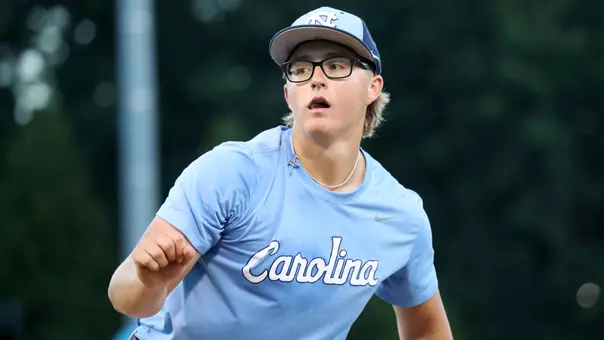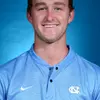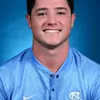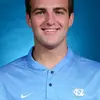University of North Carolina Athletics
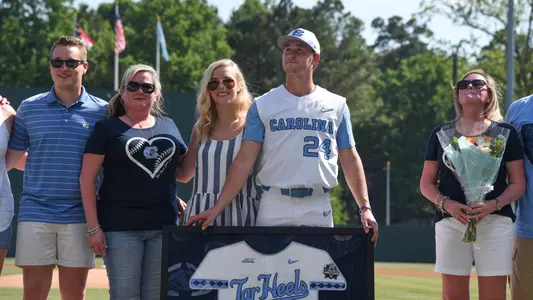
GoHeels Exclusive: Playing The Hand He's Been Dealt
May 22, 2019 | Baseball, Featured Writers
By Pat James, GoHeels.com
On Feb. 9, a week before his final season on the North Carolina baseball team began, Hansen Butler stood on a stage in the Blue Zone Concourse Club at Kenan Stadium.
A crowd of 500 sat before him, its collective attention directed toward him. In his previous four trips to the First Pitch Dinner, held before each season, he'd been among the throng of supporters and current and former players during this part of the evening. But this time, Butler, the most veteran player on UNC's roster, had a significant responsibility: to deliver the senior remarks.
The fifth-year senior opened his speech with a joke about his age; although just 23 years old, his younger teammates call him "grandpa." He also thanked his coaches and the support staff.
But the story of his baseball journey resonated the most.
Like most Tar Heel freshmen, Butler, a right-handed pitcher, arrived in Chapel Hill with hopes of stringing together three successful seasons, getting selected in the MLB draft and going on to a productive professional career. Many of his audience members once shared that same dream. Some are working toward it. Others, such as Colin Moran, have even made it a reality.
"But that's not the hand that I was dealt," Butler said. "And I wouldn't trade it for anything."
Butler reiterated that same statement last week, just a few days before he played his last regular-season game at Boshamer Stadium on Saturday. Within the next few weeks, his Carolina career will end. If put in his shoes, most people wouldn't make it this far.
They might not have overcome the injuries he's been through. Once healthy, they likely wouldn't have handled not pitching as much as they'd like the way he has. Instead, they might've transferred or quit baseball altogether. But that's not Butler.
"He's always stayed positive," said Terri Jo Rucinski, the baseball team's head athletic trainer. "His thing is that everything kind of happens for a reason. You may not see it right away. You might be angry about it right away. But after you reflect and look back, there's a reason."
For Butler, there are many.
Chasing a dream
Around the age of 6 or 7, Butler said his father, Scott, asked him and his older brothers, Holland and Houstin, if they wanted to try out for the recreation baseball league in High Point. Butler said yes. But he didn't know what to expect.
Certainly, he didn't foresee himself falling in love with the sport that day.
Growing up, he also dabbled in other sports, including basketball and golf. None of them, though, piqued his interest as much as baseball, which allowed him to play multiple positions. He enjoyed learning about each one. Then when he was 9 or 10, he started focusing on pitching.
Butler progressively improved throughout middle school, when he began working with former UNC pitcher Scott Bankhead at the North Carolina Baseball Academy in Greensboro. Upon starting ninth grade at High Point Christian Academy, Butler put on some weight and grew a few inches. His velocity increased. That, he said, helped him compete with the upperclassmen on his high school team and find success when he started participating in showcase events that summer.
"The whole freshman year and freshman summer was when it really kicked in," he said, "that I might have a legitimate chance to continue my playing career into college."
Coming off his sophomore season, Butler earned All-Tournament honors at the 2012 World Wood Bat Association 17U National Championship and the World Championship. After the former, he received several requests to call college coaches. Scott Forbes was among them.
"That was probably the one I was most excited about," Butler said. "I grew up a Carolina fan and that was my dream school from an early age."
He signed with the Tar Heels a year later.
Before coming to Carolina, Butler said he had a good curveball, but relied on his fastball. Under Forbes, the team's pitching coach during Butler's freshman and sophomore seasons, he worked on refining his mechanics and commanding his fastball, curveball and changeup better. And he thrived. Across both seasons, he went 4-0 with a 2.75 ERA over 39 1/3 innings.
Butler's growth was also evident in the prestigious Cape Cod League. Although he posted a 5.21 ERA in 19 innings the summer after his freshman season, he registered a 2.65 ERA in 20 1/3 innings after his sophomore campaign.
"Being able to compete and get those guys out, especially some of the top prospects in the league, was awesome," he said. "It gave me a lot of confidence coming back my junior year. If I can compete against those guys, I can compete against anybody, really, was my mindset."
As a junior, he appeared to be in line for a larger role after A.J. Bogucki and Spencer Trayner, the team's leaders in appearances in 2016, were drafted. But that opportunity never came.
'A heckuva guy'
Before undergoing surgery on his right ankle shortly after his freshman season, Butler typically fell off the mound to the first-base side, unable to get over the top of his ankle. The procedure fixed that. It also allowed him to generate more force – and therefore more velocity.
But by producing that additional force, a shoulder problem that had likely been lingering for some time eventually surfaced.
"You change one thing," Rucinski said, "and it kind of goes up the chain."
Butler started feeling some shoulder discomfort during his sophomore season. It ultimately sidelined him for a few weeks. But after receiving some treatment and rehabbing, he returned and pitched in nine games. He continued feeling fine throughout his summer on the Cape.
Just before his junior season, though, the pain reemerged.
"My velocity was down and to go down there and throw freely, it just felt like there was something holding me back," he said. "I had constant soreness."
At last, Butler got his shoulder examined. The diagnosis left him with a choice: either continue pitching through the pain or undergo surgery with hopes of the procedure extending his career at UNC and hopefully beyond. Two weeks into the season, he made his decision.
In March 2017, he underwent surgery again.
Butler was given an estimated recovery timetable of 6-8 months. By the time he started feeling 100 percent physically, the 2018 season was about a month away. That left little time for him to reacclimate to being on the mound. Having to get used to that again during the season, he said, was a primary reason why he finished with a 6.52 ERA in 9 2/3 innings; it wasn't due to his health.
But through all the adversity he faced, he stayed positive. His coaches and teammates, many of whom have completed their college careers, supported him the whole way. And if it weren't Greg Gatz, UNC's Director of Strength and Conditioning for Olympic Sports, and Rucinski, Butler said he wouldn't be "as strong as I've ever been."
Of course, Butler also deserves credit for the work he put in. And Rucinski doesn't hesitate to give it to him.
"You don't have to babysit him," she said. "You don't have to handhold him. He just does (what you ask him to do). He is an athletic trainer's dream, honestly."
A teammate's, too.
Connor Ollio recognized that shortly after enrolling at Carolina. Within a week of meeting Butler at the team's introductory meeting in August, the freshman pitcher said he understood Butler is "a leader and he's somebody to respect." Ollio surely does.
"Just having his presence and seeing him work day in and day out," Ollio said, "he really embodies everything Carolina is about."
Butler made a similar impression on Dylan Harris, a junior college transfer from Walters State Community College. But Butler's natural leadership isn't all Harris has grown to admire.
"The amount of stuff he does outside of baseball really stood out to me," Harris said. "He's always visiting the hospitals, hanging out with kids. He does all the things outside of baseball that nobody sees. He's a heckuva guy."
For the past two years, Butler has served as the baseball team's community outreach coordinator. He's helped organize the team's events with the Miracle League of the Triangle. When the Tar Heels visit UNC Children's Hospital, Mike Fox said Butler is the first one there.
So, when Butler learned he'd been nominated for an award at the Rammys in April, he assumed it was for an ACC Top Six for Service Award, given annually to student-athletes at each ACC school who display outstanding participation and leadership in community outreach.
But he wasn't. Instead, he saw Rucinski and Remington, the rehabilitative facility dog for the baseball team, walk onto the Memorial Hall stage minutes later.
A few weeks earlier, Rucinski received an email requesting nominations for the John Lotz Award, presented annually to a male and female student-athlete who has demonstrated a passion to succeed under adverse circumstances. They'll have also faced difficulties and overcome them while maintaining a positive attitude and serving as an inspiration to all. Without any hesitation, Rucinski nominated Butler.
On the stage that April evening, she and Remington presented him the award.
"He doesn't need the accolades," Rucinski said. "And he would never ask. And he's not going to get ACC Pitcher (of the Year), he's not going to get all that. But he's done so much to touch so many people that that's going to mean more than anything he could have done on the field."
Getting rewarded
Before last season's run to the College World Series, Butler was considering playing summer ball. But when Carolina's season ended in late June, just a month before he needed to report back to Chapel Hill, he elected to shut himself down for the rest of the summer and go through a full fall.
That proved crucial, he said, as he tossed about 25 innings then. Gradually, his velocity returned. And in many other ways, he started feeling like his old self.
"Getting back on a weekly routine and knowing I was going to get mound time every week," Butler said, "and just that consistent mound time and work with Coach (Robert) Woodard, throwing bullpens every week and throwing in games every week, that's probably when everybody on the team knew that I was pretty much back."
Still, Butler tallied just six innings across seven appearances in the first 42 games of this season. He allowed three earned runs and issued seven walks. But with the Tar Heels searching for some stability in the bullpen, he's provided it as of late.
Entering Wednesday's ACC Tournament game against Virginia, he's pitched seven innings across seven appearances in the past 13 games. In that span, he's surrendered just one earned run and opponents are hitting .160 (4-for-25) against him. The most impressive of Butler's recent outings came against East Carolina on May 8, when he matched his career highs in innings pitched (three) and strikeouts (five). He'd previously set both marks as a freshman against UNCW.
Then in last Thursday's 5-3 win over NC State, Butler entered the game with two outs and runners on first and second. The Wolfpack, then leading 3-2 in the top of the seventh, had first-team All-ACC catcher Patrick Bailey at the plate. But Butler was unfazed. He struck Bailey out on four pitches, the last a 94-mph fastball.
Watching a senior deliver such performances in the twilight of their college career is heartwarming. What Butler is doing is inspiring.
"This is going to sound like an unbelievable overstatement," Fox said, "but it's one of the highlights of my career. It really is. I get cold chills, honestly, just watching him.
"I wish every kid would just watch that and see if you just stay with it and you persevere and you just wait, (you get rewarded). Hansen Butler is going to get some big outs for us down the stretch here. He's going to get rewarded for his hard work and his patience and his character."
Rucinski will remember Butler for all of those traits, as well, long after he's gone.
"For everything he's been through, he would run through the wall for anybody," Rucinski said. "And I would do the same for him. I would bend over backwards to help him just because he is who he is. And he's going to do great things when he leaves here."
Although that'll be five years after he enrolled at UNC instead of three, Butler hasn't given up on his goal of playing baseball professionally. The way he's pitching now, who can blame him?
But whenever he's finished playing, he feels prepared to pursue another career. A double major in management and society and sociology with a minor in history, he said there's a wide variety of careers that he'll consider. He completed a wealth management internship this spring. He's leaning toward a career in that or a related field.
Butler isn't worrying about his future, though. Nor is he agonizing himself over his past. He's just focusing on the time he has left in Chapel Hill, the place he's always wanted to be.
"I've had a tremendous five years here," he said. "The amount of people and connections and friendships I've made in these five years, being able to go to my dream school and play for the program that I dreamed of playing for as a little kid watching Carolina in the College World Series year in and year out, it's been a dream come true."









